Our Heritage
The “Swan Brand” name was registered by Bulpitt & Sons Ltd, a brass founders, in the early part of the 20th century and was primarily used for their domestic range of polished aluminium products like frying pans, kettles, tea sets and jelly moulds.

In the 1920s, Bulpitt moved into electrical appliances including kettles, irons, heaters and steamers.
They pioneered the first electric element that could be immersed in water. This was a very important breakthrough because it meant that a whole 6 pints of water could be boiled in just over 9 minutes.

SWAN KETTLES
So Elementary
This led to a whole range of products based around their “immersion element”, including tea urns, kettles, steamers and coffee percolators.
Later, they developed and patented a unique safety cut-out for kettles, where the connector would be automatically disconnected if the element overheated.

SWAN TOASTERS
Warm Your Buns
The “8-30” toaster was one of the most efficient at the time.
At just over £1 it was also one of the cheapest. This was a two slice model in chrome plated steel. Even back in 1939 Swan was at the forefront of product innovation.
The Swan brand continued its success throughout the next few decades and became synonymous with solid British manufacturing quality and innovation.
There was a Swan branded product in virtually every home.

SWAN IRONS
Bright Ideas
In 1933 most homes were heating their irons over the gas ring or still putting hot coal in them.
This Swan iron was basically an element with a handle, which plugged straight into a light bulb socket. And at a mere 14 shillings (70p), it meant many households could own a prestigious Swan Products.

SWAN HEATING & COOLING
War Of The Worlds
This may look like a ray gun from a sci-fi movie but it was one of Swan’s most popular heaters.
The “Swan” bowl heater featured a cast iron base and copper reflector. These days, it wouldn’t stand a chance of passing the strict European safety standards that current Swan products conform to. Trade price in 1939: about 50 pence.

BSR
BSR were manufacturers of turntables, amplifiers and other electronics equipment, famous for their autochanger mechanism used on over a million record players!
In the 1970s BSR employed around 14,000 people at their factories in the Black Country. It was also in the 1970s that BSR acquired a number of companies/brand names: Goblin (B.V.C) Ltd, Judge International Housewares Ltd and Bulpitt & Sons Ltd.

SWAN HEATED TRAYS
Hot Hot Hot
These heated trays for keeping food or plates warm were constructed from solid aluminium.
They had temperature probes much like their modern counterparts. One brilliant innovation here though, was that the trays were equipped with a plug socket so you could power other appliances from it at the same time.

SWAN GLASS KETTLES
War Effort
Glass kettles are all the rage these days.
Swan was making this glass kettle back in 1939! The engineering skill to develop a product like this when Britain was at war was nothing short of astonishing.

SWAN HOUSEWARES
Home Sweet Home
Bulpitt’s in Birmingham also made Swan Brand teapot sets.
Designs included the Carlton (Cromalin Ware), the Empire (Cromalin Ware), the Westbury, later used for the Goblin D25 Queen Anne models, Wikka Ware, featuring an engraved basketweave pattern, and Willo, featuring an engraved Willow Pattern.
Bulpitt’s also made Swan Brand commemorative wares for the Coronation and the Festival of Britain. They also made jelly moulds including the ‘Jellette’ and some charming rabbit shaped moulds.
The three brands, Goblin, Judge and Swan became subsidiaries of BSR (Housewares) Ltd. Judge was a manufacturer of non-electrical housewares.
Goblin were manufacturers of electrical appliances including vacuum cleaners and the Goblin Teasmade, later to become the famous Swan Teasmade. The old factory at Camden Street was still making the water boilers for the Teasmade right up until 2006.
Moulinex
These were very difficult times for British and European manufacturers with intense pressure from cheaper, Far East imports.
“Bread and Butter” items like kettles and toasters became little more than kitchen fashion accessories that were changed frequently – often well before the warranty expired. The need for quality products that would last a lifetime was diminishing. This affected the electronics industry to an even greater degree and BSR eventually disappeared too.
In 1988 the Swan Brand was acquired by French manufacturers, Moulinex. Bulpitt & Sons (Swan Brand) Ltd was finally dissolved on 21st May 1989 – approximately 100 years after they were first established.
However, Moulinex were also under the same pressure from cheaper imports. The company went bankrupt in 2001 with the Moulinex brand name being acquired by Group SEB, including Krups and Tefal.

Present Day
The fascinating story continues with Moulinex selling the Swan brand before it went bankrupt to Littlewoods in 2000.
Swan Products Ltd then took over developing and marketing Swan with Littlewoods, under license in 2009. This fantastic partnership continued until July 2017 when Swan Products Ltd acquired the brand, returning it back to the original Swan employees who are passionate about the brand’s heritage.
Swan is proud that each product is conceived and designed at its headquarters in the UK, backed up by a 160 strong support team including in house designers, customer services and quality control; producing appliances, cookware and kitchen accessories that are available around the world and designed for life.

